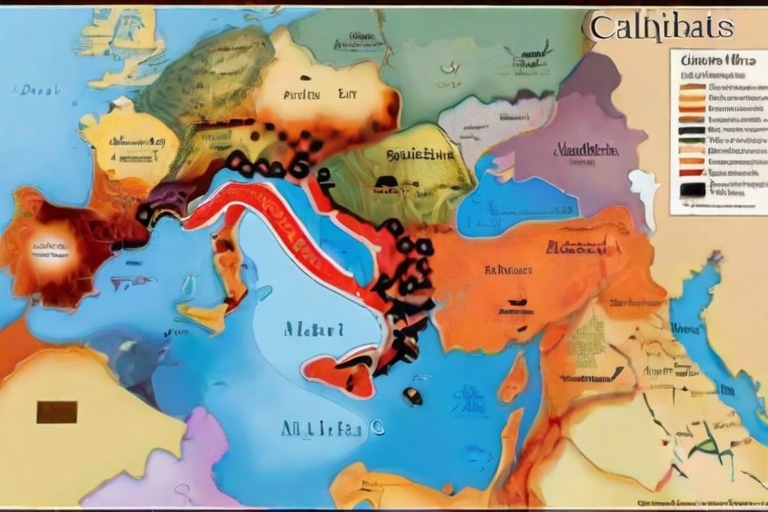
Following the passing of the Prophet Muhammad in 632 AD, a succession of empires known as the Islamic caliphates emerged, profoundly influencing the history and culture of the Islamic world.
In this article, we will delve into the timeline of the significant Islamic caliphates, which include the Rashidun, Umayyad, Abbasid, and Ottoman caliphates.
We will also explore key historical events associated with each of these caliphates.
The Rashidun Caliphate (632-661 AD)
The Rashidun Caliphate, spanning from 632 to 661 AD, was the first caliphate following Prophet Muhammad’s death.
Led by Abu Bakr, Umar, Uthman, and Ali, it saw significant expansion, conquering the Sasanian Empire and Byzantine territories.
Under Uthman, the caliphate reached its zenith.
Despite internal conflicts during Ali’s rule, the Rashidun Caliphate established principles of justice and consultation, shaping subsequent Islamic governance.
Its legacy laid the foundation for future caliphates, leaving an enduring impact on Islamic civilization.
- Read also: Why Did The Safavid Empire Decline
- Read also: Akkadian Empire Timeline
The Umayyad Caliphate (661-750 AD)
The Umayyad Caliphate, from 661 to 750 AD, was the second major Islamic caliphate, centered in Damascus.
It emerged after the reign of Ali, the fourth caliph.
Notably, the Umayyads expanded their empire, reaching Spain and North Africa, making it one of history’s largest empires.
This caliphate marked a departure from the leadership style of the Rashidun Caliphate.
Despite cultural and intellectual flourishing in Damascus, internal tensions arose due to perceived favoritism, leading to the caliphate’s eventual downfall in the Abbasid Revolution of 750 AD.
Despite its challenges, the Umayyad Caliphate’s legacy endures, influencing Islamic art, architecture, and governance during its time.

The Abbasid Caliphate (750-1258 AD)
The Abbasid Caliphate, spanning from 750 to 1258 AD and centered in Baghdad, marked a golden age of Islamic civilization.
It witnessed significant advancements in science, art, and culture, with Baghdad becoming a hub of intellectual and artistic pursuits.
The House of Wisdom played a crucial role in preserving ancient knowledge, leading to breakthroughs in various fields like astronomy, mathematics, and medicine.
Despite its cultural achievements, the caliphate faced challenges as the caliphs’ authority waned, leading to decentralization and internal conflicts.
The caliphate met its downfall with the Mongol invasion in 1258, which resulted in the destruction of Baghdad and significant losses to Islamic civilization.
Despite its decline, the Abbasid Caliphate’s contributions to Islamic culture and learning endure as part of its legacy.
The Ottoman Caliphate (1299-1922 AD)
The Ottoman Caliphate, established in 1299, was the final major Islamic caliphate, ruling over a vast empire spanning Turkey, the Middle East, and parts of Europe.
Initially flourishing under powerful rulers like Suleiman the Magnificent, the caliphate eventually faced challenges, leading to its decline.
In 1924, Mustafa Kemal Atatürk abolished the Ottoman Sultanate and the caliphate, marking the end of centuries-old imperial rule.
This event heralded a shift towards secular governance in Turkey, separating political and religious authority.
Despite its complexities, the Ottoman Caliphate’s influence on Islamic history and governance endures as a subject of study and reflection.
The End of the Caliphate System
The caliphate system, a central institution in the Islamic world for over a thousand years, ended in the 20th century with the abolition of the Ottoman Caliphate.
This marked a significant shift in Islamic history, prompting debates about governance and the role of Islam.
Mustafa Kemal Atatürk’s reforms in Turkey led to the separation of religious and political authority.
The end of the caliphate system reshaped Muslim-majority nations’ governance models, balancing tradition and modernity.
Overall, it represented a turning point in Islamic governance and identity, as nations navigated new challenges while honoring their historical heritage.
- Read also: A Journey Through Babylonian Empire Timeline
- Read also: Egyptian Empire Timeline
Conclusion
The Islamic caliphates played a pivotal role in the growth and dissemination of Islam, significantly influencing world history.
The Rashidun, Umayyad, Abbasid, and Ottoman caliphates individually left enduring imprints on the territories under their rule and the broader Islamic civilization.
To grasp the multifaceted history of the Islamic world, it is crucial to delve into the timeline and pivotal events of these caliphates.
This exploration offers insight into the rich and diverse historical narrative that has shaped Islamic civilization over the centuries.


